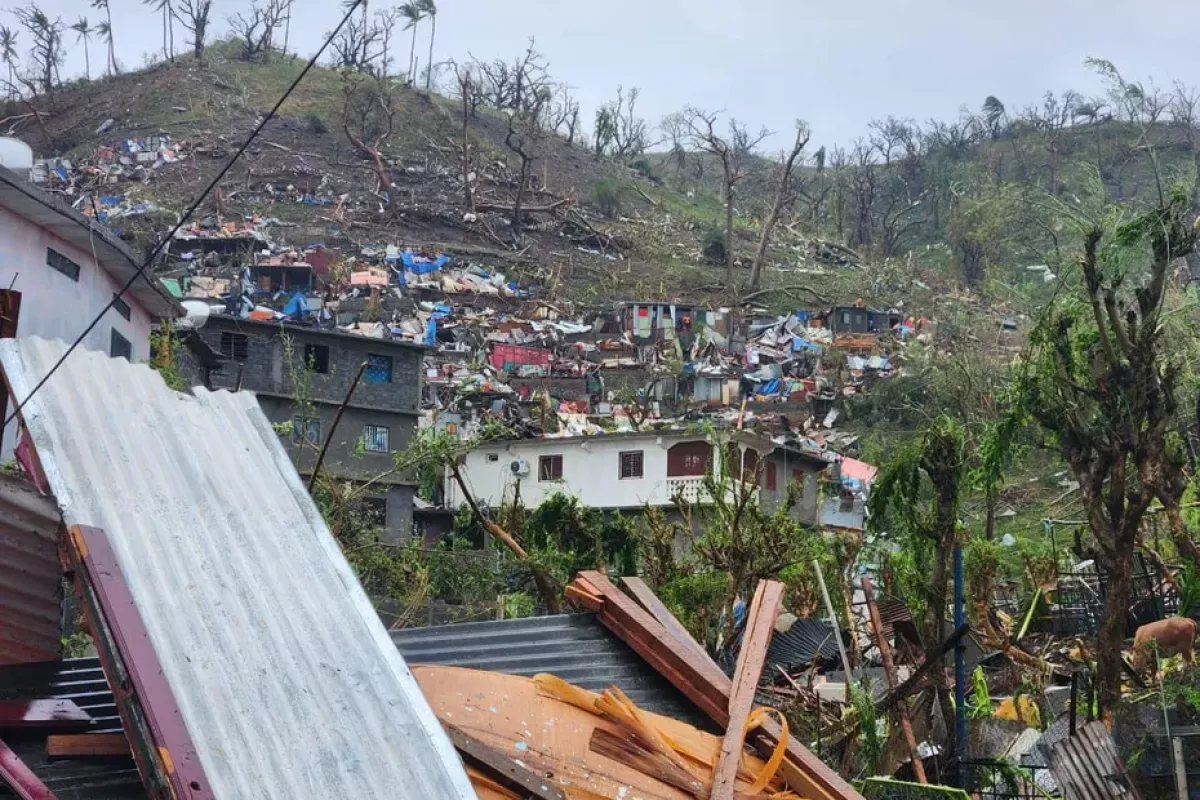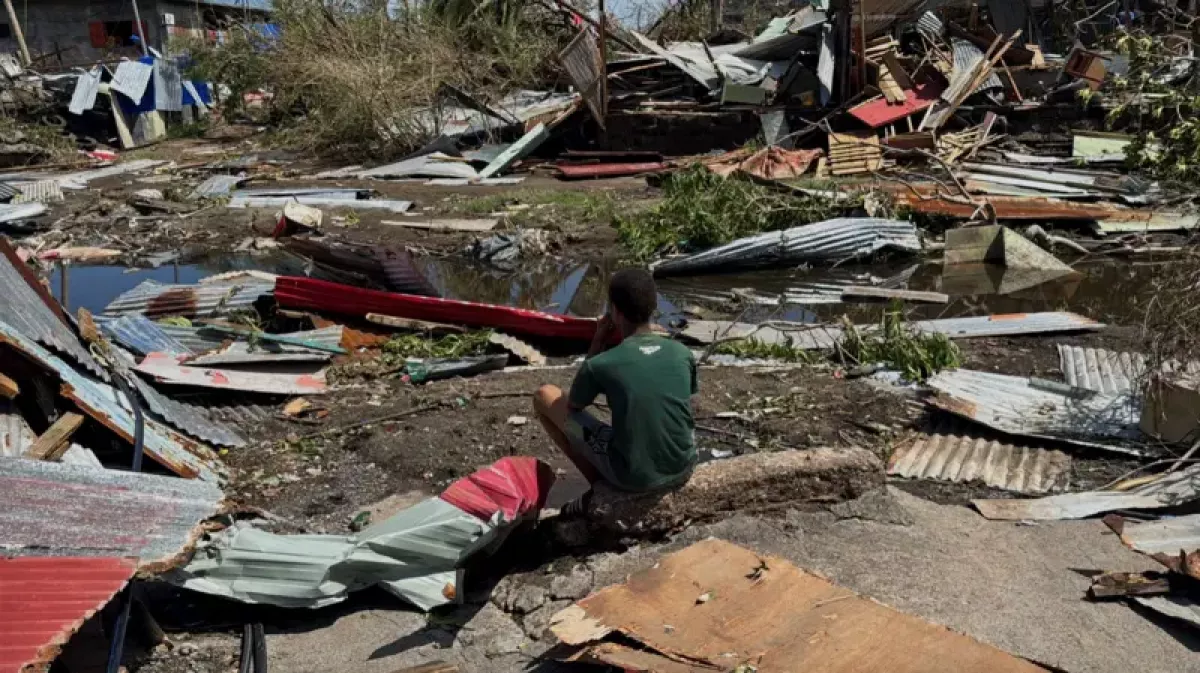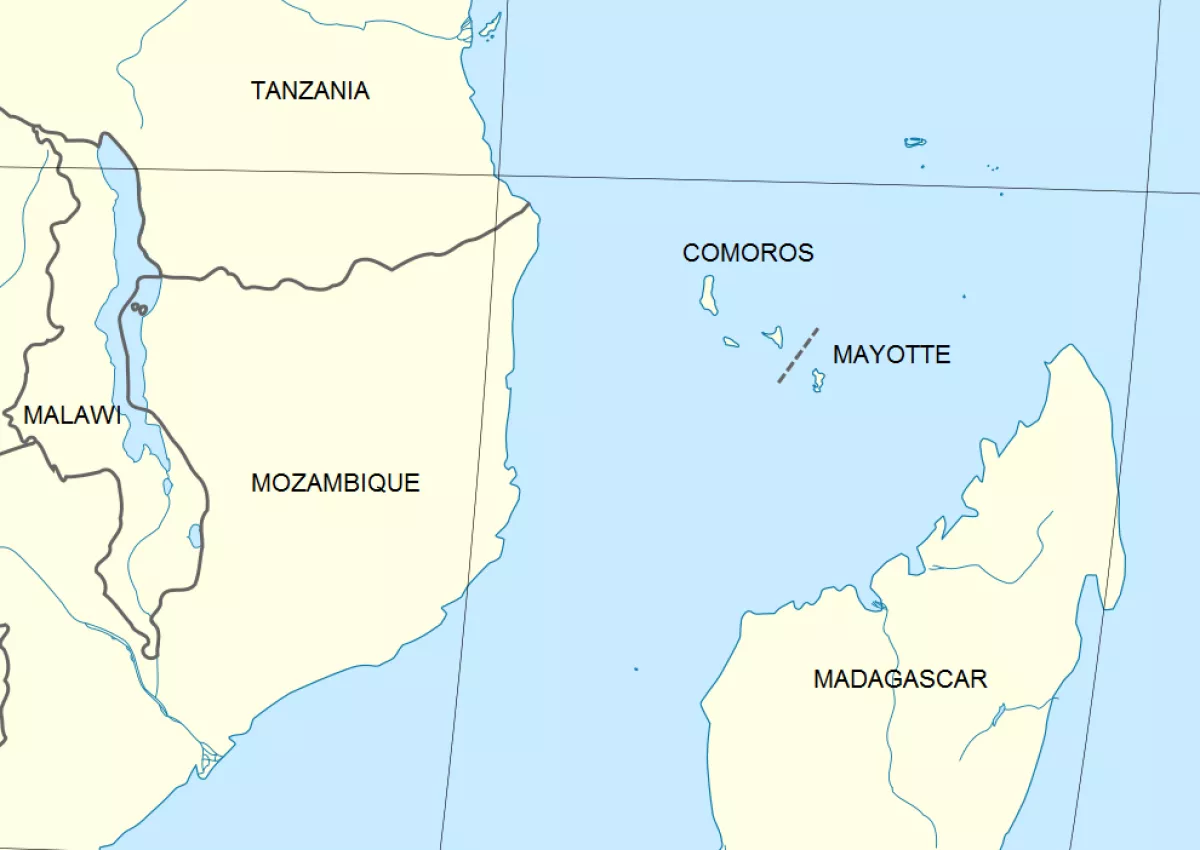Mayotte’s struggles amid French indifference, natural disasters Cyclones and poverty
Mayotte, a small archipelago in France's overseas territories, continues to endure nature's relentless wrath. Even in the absence of hurricanes, the region's residents face severe poverty, a stark reality across many of France's overseas departments. The devastating aftermath of Cyclone Chido remains unaddressed, and on January 12, the island was battered once again, this time by Storm Dikeledi.
A tropical crash test
For the residents of France's overseas territories, the phrase "poor people" is far from an emotional metaphor. On 12 January, the French island of Mayotte in the Indian Ocean was hit by a new tropical storm, Dikeledi. As a result, rivers once again overflowed, and in the south of the main island, Grande-Terre, four villages were completely submerged. Gale-force winds tore off the tarpaulin covering many roofs, which had yet to be repaired after Cyclone Chido.
Less than a month ago, the deadly Cyclone Chido devastated the archipelago of Mayotte. Wind speeds reached 225 km/h, while ocean waves surged to heights of 5 to 9.5 metres. Towering waves as high as a three-story building were accompanied by torrential tropical downpours that inundated everything in their path.
In the aftermath of the cyclone, the destruction on the islands resembled scenes from apocalyptic films. Entire settlements and urban districts were virtually wiped off the map. The city of Mamoudzou was left in ruins, and its port was partially submerged. The city and port of Dzaoudzi also suffered severe damage. Local residents liken the devastation to the aftermath of a nuclear war.
Official reports state that 39 people have died, while another 246 were hospitalized in critical condition. Injuries of varying severity were sustained by approximately 1,500 individuals. In total, Cyclone Chido affected 70% of the archipelago's population. A significant number of people went missing, with relatives searching for them through dedicated social media pages.
The Prefect of Mayotte, François Xavier Bieuville, has suggested that the death toll could reach hundreds or even thousands. This is largely due to the fact that around 100,000 people live in Mayotte without documentation or registration. Many of these migrants resided in makeshift shantytowns made of cardboard and plastic, which were easily destroyed by the powerful storm.
Nearly all fragile and dilapidated housing on the archipelago was obliterated. Around 80% of mobile communications on the island were wiped out, 15,000 households were left without electricity, and water supply systems ceased functioning. Most roads were blocked by debris, severely disrupting transportation. The local airport was also impacted.
The following day, an airlift was established via Réunion to provide assistance. However, as residents reported, even three days later, many remained without electricity or drinking water and saw no signs of aid or rescue teams.
Several hospitals were rendered inoperable, with only 40% still functioning. This, combined with the lack of potable water, raised the threat of cholera and other infectious diseases, including hepatitis.
Approximately 40% of schools were either destroyed or damaged. Additionally, 500 out of Mayotte’s 8,700 teachers requested urgent repatriation from the overseas territory.

In the first three days following the cyclone, the archipelago, still in shock, did not record any criminal incidents. However, looting and pillaging soon began, with crowds gathering outside supermarkets and car repair shops. The items most targeted were essential goods, which many people were deprived of.
To prevent disorder, the local authorities mobilized 1,600 gendarmes, with an additional 400 sent to the islands. A total of 700 French soldiers were also deployed to the archipelago. A curfew was imposed starting on 17 December, but on the very first night, two gendarmes were injured.
Preliminary estimates put the total damage from Cyclone Chido at between $600 million and $800 million. Only 6% of the population had their homes insured. A "state of exceptional natural disaster" was declared in Mayotte, a measure never before implemented. According to French Prime Minister François Bayrou, Mayotte experienced "the most severe natural disaster in France's history in several centuries."
Additionally, according to data from Imperial College London, the unprecedented intensity and destructive power of Chido were attributed to climate change caused by greenhouse gases.
Macron – not Santa Claus
French President Emmanuel Macron decided to make a grand gesture and visited Mayotte before the New Year. He arrived on the stricken islands after a meeting in Brussels with Ukrainian President Volodymyr Zelensky. Along with Macron, 20 medical workers, rescuers, and logistics specialists flew to the archipelago, bringing 3 tonnes of water and a supply of medicines. However, the people of Mayotte did not appreciate these New Year gifts and refused to believe in Macron as "Santa Claus." The French president was greeted with boos. The residents confronted him directly, saying: "Macron, resign!" "Tomorrow you’ll have food and water, but we’re dying!" "This is worse than Haiti."
Macron generously promised to increase aid and defended himself against the angry residents, stating that he was personally not at fault and that the hurricane was to blame for the devastation. However, his behaviour was perceived as arrogant, as he shouted at people who had lost everything, and criticized Nassurdine Haidari, president of the Representative Council of Black Associations. The French newspaper Liberation compared Macron's conduct on the suffering island to the actions of a rude colonial master. Indeed, the French president did not shy away from harsh language, resorting to slang and belittling the local Mahorais population: "You are happy to be in France. If it wasn't for France, you would be in way deeper shit, 10,000 times more, there is no place in the Indian Ocean where people receive more help."
The problem lies in the fact that Mayotte is the poorest region of France. The aftermath of the storm, set against the backdrop of the chronic depression of this de facto colony of Paris, has become catastrophic. Around 75% of the population of this territory had been living below the poverty line even before the hurricane, and one in three was unemployed. Between 30% and 40% of Mayotte’s residents are illiterate, and only 45% speak French. The Kaweni slums in this department are the largest in France.
A cholera epidemic, which is now feared, already visited Mayotte last year, without the presence of any cyclone. From March to July 2024, at least five people died from cholera in this French overseas department. This is hardly surprising, as even before the hurricane, drinking water in some areas had a light brown tint. Moreover, the strain that caused the cholera epidemic was found to be highly resistant to antibiotics.
In addition, Mayotte, with a population of 321,000, has only 260 doctors—more than four times fewer than mainland France. Is this not a colonial approach? Naturally, the average life expectancy in this French overseas department is lower than in France as a whole, by 7 years for women and 11 years for men.

The dire situation in Mayotte has also been exacerbated by a government crisis, triggered by the reckless actions of President Macron. The absence of a full cabinet of ministers in the initial period following the hurricane hampered the delivery of aid. Furthermore, the new Prime Minister François Bayrou stated that he could only visit the affected archipelago once his government had been fully formed.
Neocolonialism and separatism
French Minister of the Interior Bruno Retailleau is already attempting to shift the responsibility for the crisis in Mayotte onto the neighbouring state of Comoros. According to this right-wing conservative politician, known for his anti-migrant statements in France, immigration to Mayotte should be restricted. Retailleau believes that France must be "much tougher towards the Comoros." The French Interior Minister claims that the Comoros are allegedly engaging in a "covert occupation" of Mayotte and conducting a "hybrid war."
However, according to Fabien Roussel, the leader of the French Communist Party, Bruno Retailleau is completely uninformed about the situation on the archipelago: "Ministers don’t spend the night in Mayotte because there are no 4-star hotels—it's a shame for the Republic." Roussel also believes that due to the "sin of pride," the French government refuses to seek help from international organizations.
The French government’s response to the humanitarian crisis in the overseas department of Mayotte has been criticized by a range of political figures. François Ruffin, a deputy from the New Popular Front, along with environmentalist deputy Benjamin Lucas and one of the leaders of the Workers' Struggle (Lutte Ouvrière), Nathalie Arthaud, all condemned the government's actions. Even far-right representatives, such as Hélène Laporte and Sébastien Chenu from the National Rally (RN), joined in the criticism. Interestingly, the far-right party of Marine Le Pen achieved strong results in Mayotte, which has a predominantly non-white and Muslim population.

An intriguing aspect of the ongoing justification for France’s neocolonial policies is the frequent reference to the results of several referendums held in Mayotte since 1976. In these votes, a majority of participants supported the remaining part of French territory, while the inhabitants of the Comoros voted for independence from Paris. However, the key issue lies in the fact that Mayotte is, by all definitions, part of the Comoros Islands. Holding a referendum on the separation of Mayotte from the other islands, which share geographical, cultural, and historical unity, is essentially separatism and a violation of international law.
The Constitution of the Islamic Republic of the Comoros considers Mayotte to be within its territorial sovereignty. This position is grounded in UN Resolution 33/85 from November 12, 1976, which rejects "any other form of referendum or consultation which may hereafter be organized on Comorian territory in Mayotte by France." Additionally, UN General Assembly Resolution 49/18 from 1994 reaffirmed the Comoros' sovereignty over Mayotte. Therefore, the declaration of Mayotte as a French overseas territory in 2011 was deemed invalid by the President of the Comoros. Both the African Union and the United Nations have condemned this essentially illegal occupation more than 20 times. However, the UN Security Council, where France holds veto power, has not passed a corresponding resolution.
These islands are divided by a kind of "Berlin Wall." Since 1995, residents of the other Comoros islands have been required to obtain a so-called "Balladur visa" to visit relatives in Mayotte. However, all islanders are Comorians by birth and, therefore, cannot be considered illegal immigrants in Mayotte. Against this backdrop, the Mozambique Channel has become one of the largest maritime graveyards, with over 10,000 Comorians drowning in its waters. Is this not a crime of modern neocolonialism?
In France itself, the issue of this overseas department is viewed differently. Some argue that Mayotte doesn't produce anything, has no natural resources, and yet the subsidies for it exceed one billion euros annually. Why does it even matter to the metropolis? However, the former empire tightly clings to these islands — both for prestige reasons and to use the archipelago for electronic surveillance and other military-strategic purposes in the Indian Ocean.
On one hand, neocolonialists are outraged by the "ingratitude" of the Mahorais of Mayotte, who enjoy a higher standard of living than those on the other Comoros islands but have been constantly rebelling against French rule since 2011. On the other hand, the French government, still living in imperial myths, is reluctant to let go of the archipelago. So perhaps Paris should focus on resolving its own internal issues? Should it finally abandon colonial thinking, stop stoking tensions, and refrain from seeking further defeats in its ventures in regions that have no bearing on France?








